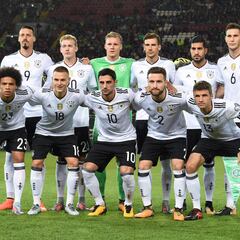Ghost goals in World Cup history
The name may be recent but the idea is as old as the hills, and goals that shouldn’t have been have altered the fabric of the game forever


The term “ghost goal” entered the English language only fifteen years ago, but of course the phenomenon has been part of the game since the earliest pig’s bladder was booted past a chalk line.
Of course, any goal that is borderline or questionable will draw criticism from all sides. There will be those who argue that they definitely saw the ball clearly in, and others who are just as vehement that they saw it clearly on the line.
The term was coined by then-Chelsea chief Jose Mourinho in 2005, when Liverpool’s Luis Garcia put one over the line in the Champions League semi-final match between the two teams. With his customary humorous, if acerbic, delivery, “the Special One” let the world know that the goal was not legitimate in his eyes, and the term has gained a foothold in the English language, often repeated by the press.
In the qualification stage for the current 2022 Qatar World Cup, there was another “ghost goal” acted out in reverse, when in a match between Serbia and Portugal, Cristiano Ronaldo scored what looked to be the winning goal in stoppage time. The referee did not award the goal despite the ball clearly being across the line, and with no goal line technology or VAR in the game, his decision stood.
But in the actual World Cup itself, there are two incidents involving, interestingly enough, the same protagonists. In the 2010 World Cup in South Africa, England were trailing Germany 2-1 in the Round of 16 when Frank Lampard hit a shot off the crossbar that bounced well inside the goal. The referee thought that it was not a goal and did not award it, swaying the momentum of the game entirely. Instead of levelling the score and punching from the front foot, England were deflated and went on to lose 4-1.
But the most important “ghost goal” in World Cup history is without a doubt the tie-breaking Geoff Hurst goal in the England vs West Germany final of the 1966 World Cup. With the score tied 2-2, Hurst’s shot hit the crossbar and bounced down. The Germans swore that they saw chalk fly when the ball hit the ground, indicating that the ball hit the line, but all of the English players in the vicinity all swore that they saw it clearly in the goal.
Related stories
Swiss referee Gottfried Dienst wasn’t sure and consulted with his Soviet assistant Tofik Bahramov, who awarded the goal. England went up 3-2 and after the famous “they-think-its-all-over” moment, scored a fourth to win 4-2.
With the advent of goal line technology’s use in the World Cup since 2014, pushed ahead in no small part by the widespread criticism of the 2010 Lampard scandal, “ghost goals” in the World Cup should become a thing of the past. But as the Portuguese learned in Serbia, it can still find its way into the game when you least expect it.

